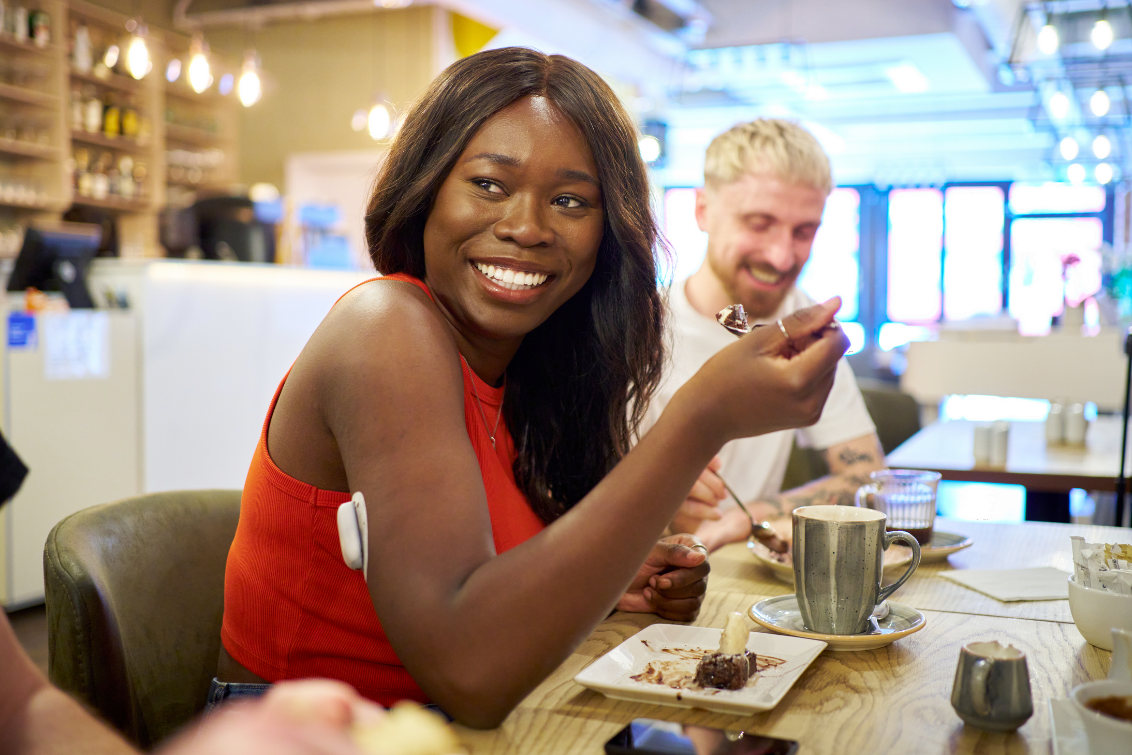Finding resilience through self-nurturing and advocacy

Avid traveler, aesthetic doctor, and Omnipod® Ambassador, Temi Olonisakin, reflects on her diagnosis with an important message about self-care and what she has learned from living with diabetes... Read on to find out more...
*Temi has been paid a fee to produce this content
I was diagnosed with type 1 diabetes on 27 April 2012.
It baffles me, sometimes, how that day can feel both like yesterday and a lifetime ago. That day changed everything, and I walked away carrying a lot of heavy emotions. Including a cloud of shame.
Questions began spiraling through my mind:
- Did I somehow deserve this diagnosis?
- What will people think of me?
- Will anyone understand me and what this means?
For years, those thoughts were my constant companions. Beyond my family, I told no one about my new diagnosis. Not even my closest friends. I figured they can’t judge me if they don’t know. And while they had never judged me before, I wasn’t ready to risk finding out due to the stigma surrounding diabetes.
I was diagnosed on a Friday and went back to school on Monday. I had goals and I wanted to achieve them, so I returned to school at once. I had decided as a young child that I wanted to be a doctor. Diabetes was not going to stop me.
I remember having my first hypo in a chemistry exam. Initially I confused it for anxiety or nervousness. I had put a lot of pressure on myself because I wanted to do well. When I left at the end of the exam and checked my blood glucose levels, I was 3.2 mmol/L.
Thankfully, I was okay, and I ended up passing the exam.
Exposing diabetes and change
A year after diagnosis, I started university.
After reading blog after blog about living safely on your own with diabetes, I finally decided to share my diagnosis with a few friends I had made. It inspired and encouraged me to open up to my childhood best friends, who were shocked and disheartened that I had felt the need to hide something so important.
What a HUGE weight off my shoulders that was!
Over the next few years, I grew to become more comfortable informing people that I was living with type 1 diabetes. But then I faced another difficult choice. I was presented with the possibility of using an insulin pump to help manage my diabetes.
I declined it.
Hiding the shame
One “perk” of living with diabetes is that it is an invisible illness.
And an insulin pump would change that. With a pump, no longer would it only be my family and friends who could see my diabetes – I would be sharing this part of me with everyone. Even strangers on the street!
That shame I felt as a teenager, when I was newly diagnosed, was still very much alive.
Looking back, I now understand that a lot of my shame came from a lack of education – my own and those around me. During medical school, I heard every diabetes joke and myth including “eating too much sugar gives you diabetes!” from my fellow medical students. Who, frankly, should have known better.
I internalised it all and kept a lot of feelings to myself.
Without a solidified support system or a community connection to diabetes, I had no way to fully process those feelings.
But things have come a long way since then and I have learned to advocate for myself and empower others living with type 1 diabetes.
Finding strength
As a Nigerian woman, it's taboo to talk about your health conditions. It's something that you keep to yourself. You don't bring it up.
And you certainly wouldn't share it online.
I wished there had been someone out there I could resonate with and who makes me feel like it’s okay. But it feels like you end up seeing one specific sort of person with diabetes all the time. So, I thought maybe I would start sharing a few posts online.
And people started messaging me, saying things like “I've never seen a Black woman talking about diabetes online before!” It makes me feel so good.
Diabetes is not something shameful.
Living with diabetes has taught me about vulnerability. It has shown me there is strength there, and openness is liberation. If sharing my journey can help even one person feel less alone or better understood, then every conversation and every post dedicated to awareness and education is worth it.
I want people to know – those living with diabetes and not – that our experiences with type1 are complex and profound. And all our voices matter.
I will keep sharing, keep advocating, and keep hoping that others, like the teenager I was, know that they are never alone in this journey.